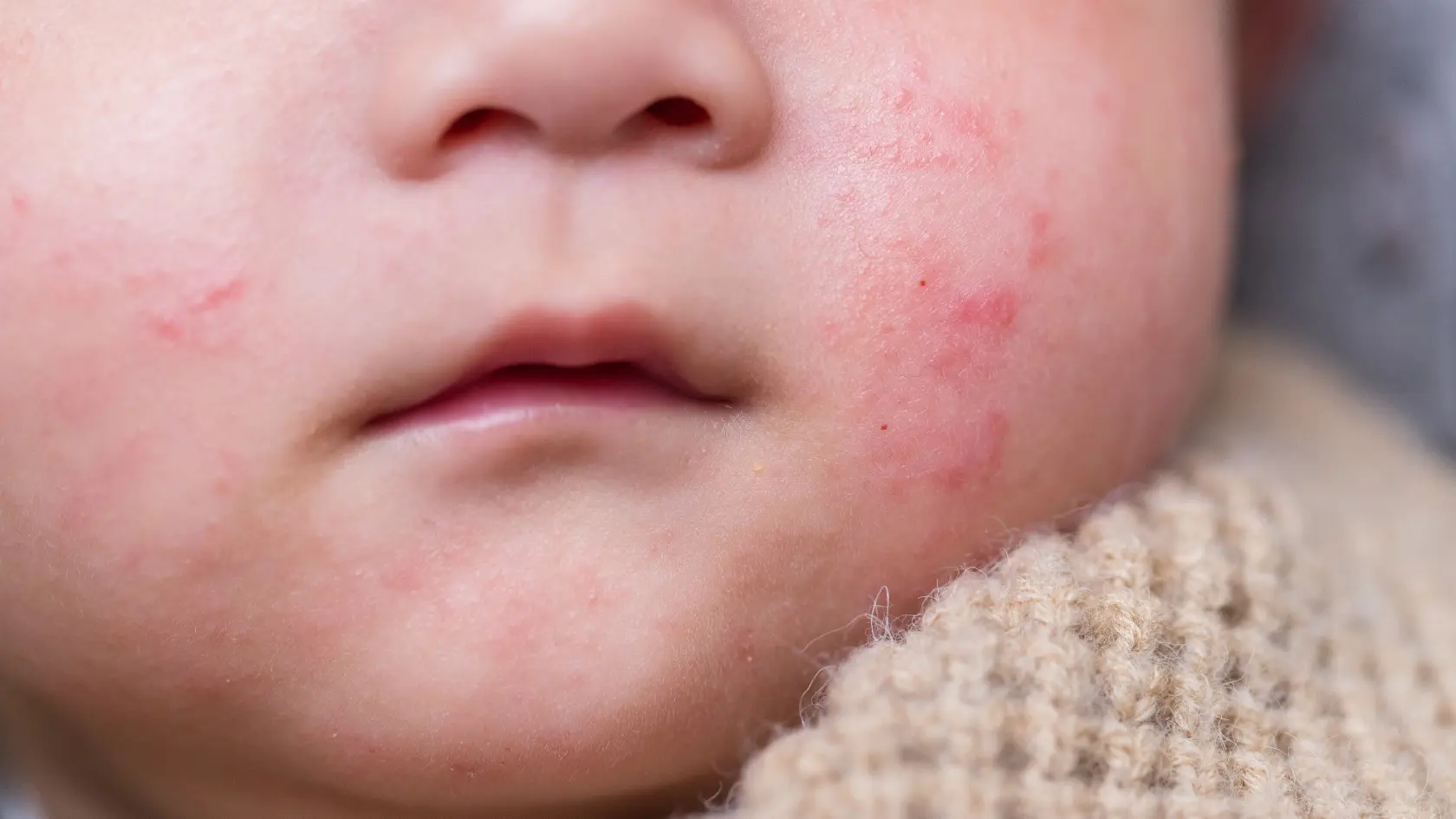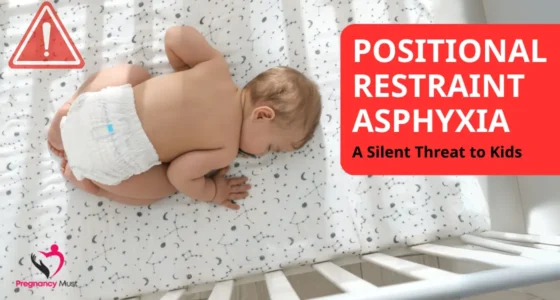Eczema in infants and toddlers is a skin disorder that is rather common and affects a lot of children. The skin of your child may become dry, itchy, and inflamed as a result of this, which will provide discomfort. The most important thing for parents coping with this challenging condition is to have a solid understanding of what causes eczema in babies, how it may be treated, and the most effective treatments, such as baby eczema cream.
In this comprehensive guide, we’ll explore everything you need to know about baby eczema. From causes and symptoms to expert recommendations on eczema in babies and the best ways to treat it, you’ll find valuable insights for your child’s care.
Table of Contents
What Is Baby Eczema?
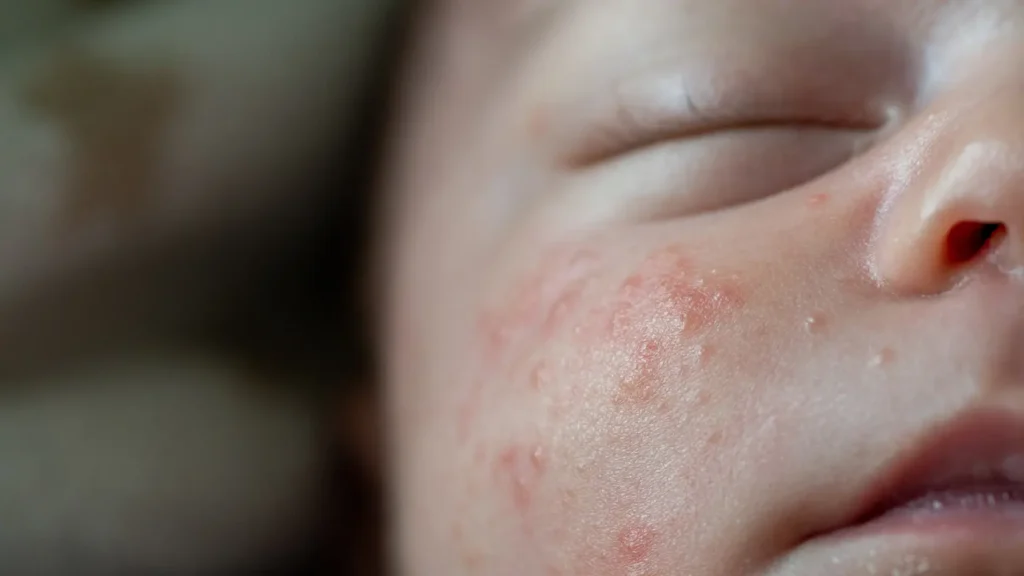
Baby eczema, also known as atopic dermatitis, is a chronic condition that affects the skin. It typically appears in infancy or early childhood and can range from mild to severe. In addition to being red, dry, irritated, and itchy, the condition causes the skin to turn red. The face, the scalp, the elbows, the knees, and the back of the neck are some of the places that frequently exhibit this condition. Eczema is a condition that most commonly affects infants and has a tendency to flare up and then reduce over time. Baby eczema can cause minor irritation to severe eruptions, depending on the severity of the condition. Among these symptoms are:
Symptoms of Baby Eczema
The symptoms of baby eczema vary from mild irritation to severe outbreaks. These symptoms include:
- Red, inflamed patches of skin, especially on the cheeks, forehead, and chin
- Itching, which can be severe and persistent, leading to scratching
- Dry, flaky skin that can crack and bleed
- Small, raised bumps that may leak fluid when scratched
- Thickened skin with visible scaling or crusting
In some cases, eczema in babies can lead to infections if the skin becomes damaged from excessive scratching.
What Causes Eczema in Babies?
Although the specific etiology of baby eczema is unknown, research indicates that a mix of hereditary and environmental factors contributes to the development of this condition. The following is a list of the primary contributing factors and causes of eczema in babies:
1. Genetic Factors (Heredity)
In the event that either you or your spouse has a history of eczema, asthma, or any other allergy problems, the likelihood of your child acquiring eczema is significantly increased. This occurs as a result of genetic inheritance, which enhances the likelihood that their immune system may react to allergens or irritants that are present in the environment. Genetic characteristics that are passed down through generations play a significant part in the development of skin disorders, which might result in an increased susceptibility to allergic reactions. Eczema, hay fever, and asthma are just some of the disorders that can be caused by genetic abnormalities that impair the natural defensive processes of the skin, leaving infants susceptible to infections. As a result of the fact that a family history can increase the likelihood of your child having eczema, it is essential to keep an eye out for early skin indicators. There is also the possibility that environmental variables can combine with genetic vulnerability, causing eczema flare-ups in children who are genetically predisposed to the condition or making them worse. There is a possibility that epigenetic factors have a role in determining how a child’s skin reacts to environmental chemicals. When some genes that are part of the immune system are passed down from generation to generation, it becomes more difficult for the skin to remain untouched by allergens. It is possible that parents who suffer from allergies or eczema will discover that their child’s immune system is also susceptible to hypersensitivity and persistent inflammation.
2. Skin Barrier Deficiency
Babies who suffer from eczema frequently have a compromised skin barrier. It is because of this that their skin has a difficult time retaining moisture and protecting itself from irritants, which ultimately results in dryness and irritation. When the barrier is not functioning properly, allergens, germs, and irritants are able to infiltrate the skin, which makes the problem even worse. Skin that lacks adequate barriers is unable to prevent the loss of moisture, which results in the skin becoming dry and more susceptible to further harm. When there is not a robust barrier, essential oils and moisture are easy to leave, leaving the skin open to the harmful effects of chemicals and pollutants from the environment. There is a breakdown in the protective mechanism of the skin, which makes it possible for dangerous substances to irritate the layers beneath the surface. Because of this, the likelihood of coming down with an infection is increased because bacteria can readily enter. Enhanced sensitivity to external influences is another potential consequence of a barrier that is not functioning properly. As a result of this lack of protection, scaly areas, redness, and itching are frequently observed. Specific diseases, such as atopic dermatitis, are known to contribute to the vulnerability of the barrier, which in turn makes eczema even more widespread. It is possible for infants who have this ailment to suffer from painful skin breakdown, which results in their experiencing persistent discomfort. The permeability of the skin grows with age if it is not treated with the appropriate treatment, which makes it more prone to an outbreak of the condition.
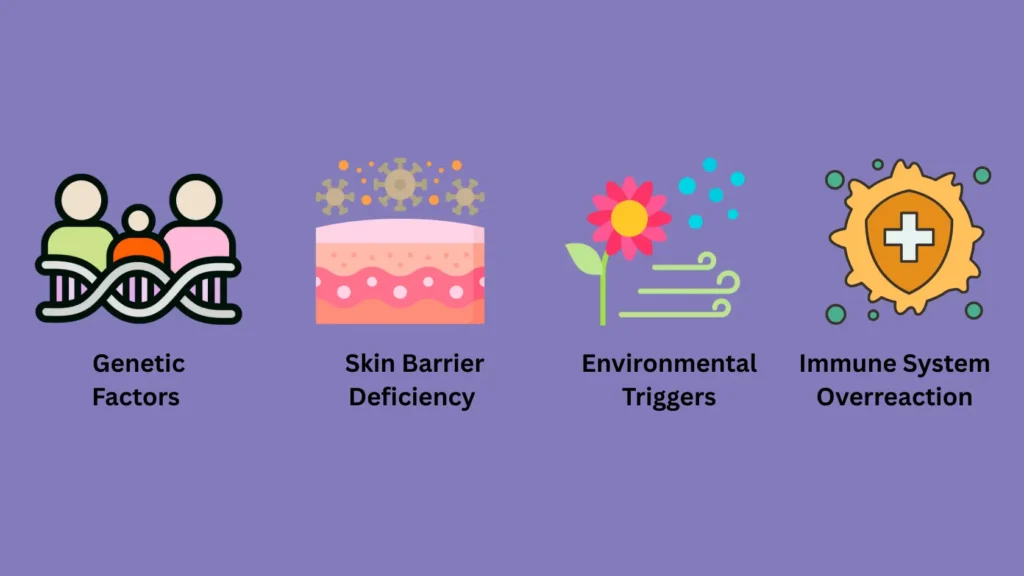
3. Environmental Triggers
It is also possible for flare-ups to be brought on by environmental triggers, such as dust mites, pollen, pet dander, or specific foods. This is something that can actually happen. Dry air, especially during the winter months, can make eczema symptoms worse since it causes the skin to become more dry. This is especially true during the winter months. All types of personal care products, including soaps, lotions, and detergents, contain perfumes that have the potential to irritate the skin. In addition to the aforementioned environmental factors, exposure to cigarette smoke, chemicals, or harsh cleaning products can also cause flare-ups. These are the environmental elements that are most widespread in the environment. Air pollution has the potential to exacerbate the symptoms of eczema because it exposes the skin to a variety of foreign substances, including toxins and pollutants. When the skin is left moist for a lengthy period of time, it is possible for eczema to be caused by perspiration that is created by physical exercise. This is the case if the sweat is left on the skin. Garments made of wool or synthetic materials have the potential to irritate the skin, which could make the problem even more severe. It is possible for the skin to become dry and, as a result, more prone to flare-ups when it is subjected to severe conditions, such as hot and cold temperatures. Mould and mildew allergens can also act as irritants, adding to the severity of symptoms and making it more challenging to treat them. Outbreaks of eczema can be a source of discomfort, and environmental stressors such as sudden climate changes, high humidity, and pollution can all contribute to the development of eczema outbreaks. A significant number of infants who suffer from eczema are triggered by the dander that is produced by animals, particularly cats and dogs. This is one of the most significant symptoms. The fact that dust mites can cause even more severe eczema flare-ups is a widely accepted hypothesis. Dust mites can be found in upholstered furniture, carpeting, and bedding.
4. Immune System Overreaction
In infants who suffer from eczema, the immune system may respond excessively to common allergens such as pollen or dust, resulting in inflammation and irritation of the skin. This is the reason why a significant number of children who have eczema also suffer from other allergy disorders, such as asthma or hay fever. The overproduction of histamine, which is caused by hyperactive immunological responses, causes the skin to become red, swollen, and itchy. Inflammation occurs when the immune system fails to recognize harmless substances as potential dangers and instead attacks them. This malfunction of the immune system results in persistent inflammation, which makes the symptoms of eczema even more severe. It is common for infants who have eczema to develop allergic responses to food, particularly dairy products, nuts, or eggs, which can further aggravate the patient’s condition. Because of its sensitivity to a wide range of environmental stimuli, the immune system is more likely to suffer from an exaggerated reaction to allergens and irritants from the environment. In addition, a dysfunctional immune system can cause other illnesses, such as hay fever, allergic rhinitis, or asthma, to occur at the same time as eczema. In many cases, eczema flare-ups are brought on by elevated levels of IgE, which is an antibody that is connected with allergic reactions. It is possible that an overreaction of the immune system can make infants more susceptible to seasonal changes, pollen, and even typical household irritants such as dust or pets. Eczema is made worse by immunological dysregulation, which also leads to inflammation in other parts of the body because of its effects. Acquiring an understanding of this immunological imbalance can be beneficial in the management of eczema, as well as any allergy disorders that may accompany it.
How to Treat Baby Eczema: Top Recommendations
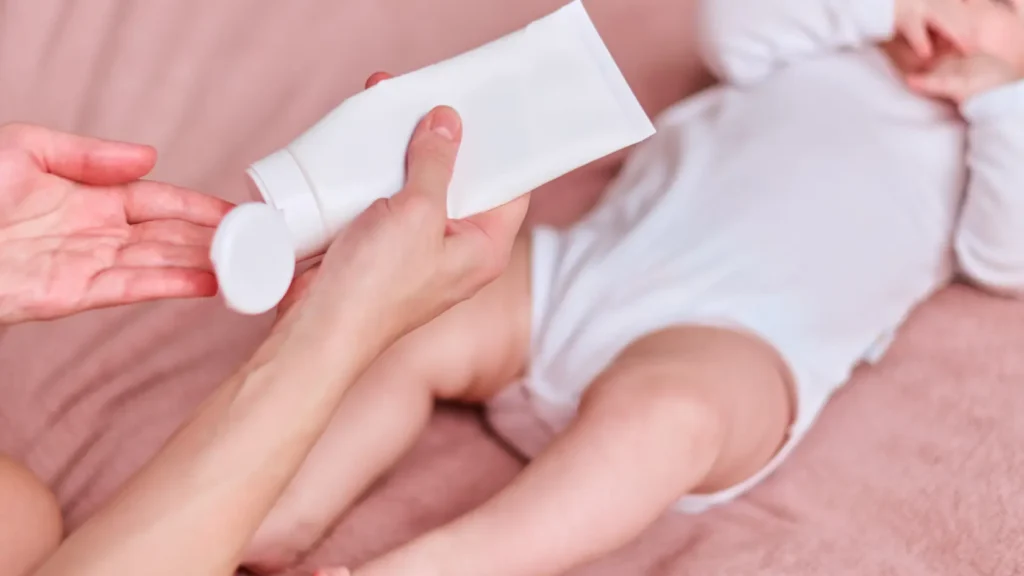
Treating eczema in babies requires a combination of good skincare practices, lifestyle changes, and sometimes medications. Here’s a breakdown of how to effectively manage your baby’s eczema:
1. Use of Baby Eczema Cream
Using a specialist baby eczema cream is one of the most effective methods for treating eczema in babies. These creams are formulated to bring relief to skin that is dry and irritated while also retaining moisture. The creams that are the most beneficial are those that contain ceramides, colloidal oatmeal, shear butter, and other moisturizing substances that restore the natural barrier of the skin.
When selecting a baby eczema cream, choose a product that is:
- Fragrance-free and free from harsh chemicals
- Hypoallergenic, to avoid irritation
- Clinically tested and safe for babies’ sensitive skin
A number of well-known brands of baby eczema creams, including as Eucerin, Aveeno, and CeraVe, are all recommended by dermatologists for use on sensitive skin.
2. Moisturize, Moisturize, Moisturize
Consistent moisturizing is the key to treating eczema in babies. It is important to apply a light moisturizer that does not include any fragrance on a regular basis since it helps to lock in moisture and prevents the skin from becoming dry, which can lead to flare-ups. The baby eczema cream should be applied immediately after bathing, while the skin is still damp, in order to prevent leakage of moisture.
How I Cured My Baby’s Eczema: Parent Experiences
A significant number of parents have been able to successfully control their child’s eczema by adhering to a prescribed skincare routine, making adjustments to their child’s environment, and making use of natural therapies. Here is what several parents found to be successful:
Dietary Changes
In certain cases, babies with eczema may have food sensitivities that contribute to flare-ups. Some parents have found that eliminating common allergens such as dairy, eggs, and nuts from their baby’s diet (or the mother’s diet if breastfeeding) helped alleviate symptoms. Always consult a pediatrician before making any dietary changes.
Lifestyle Adjustments
Maintaining a clean and allergen-free environment is crucial for babies with eczema. Parents can:
- Use air purifiers in the nursery to reduce allergens.
- Wash bedding, clothing, and towels frequently using fragrance-free detergents.
- Keep pets out of the baby’s room to reduce exposure to dander.
Natural Remedies
There is a possibility that infants who have eczema may have food sensitivities, which can be a factor in attacks of the condition. A number of parents have discovered that removing common allergens from their child’s diet, such as dairy products, eggs, and nuts (or the mother’s diet if she is breastfeeding), has been effective in reducing the severity of certain symptoms. Before making any modifications to your child’s diet, you should always check with a pediatrician.
How to Prevent Baby Eczema Flare-Ups
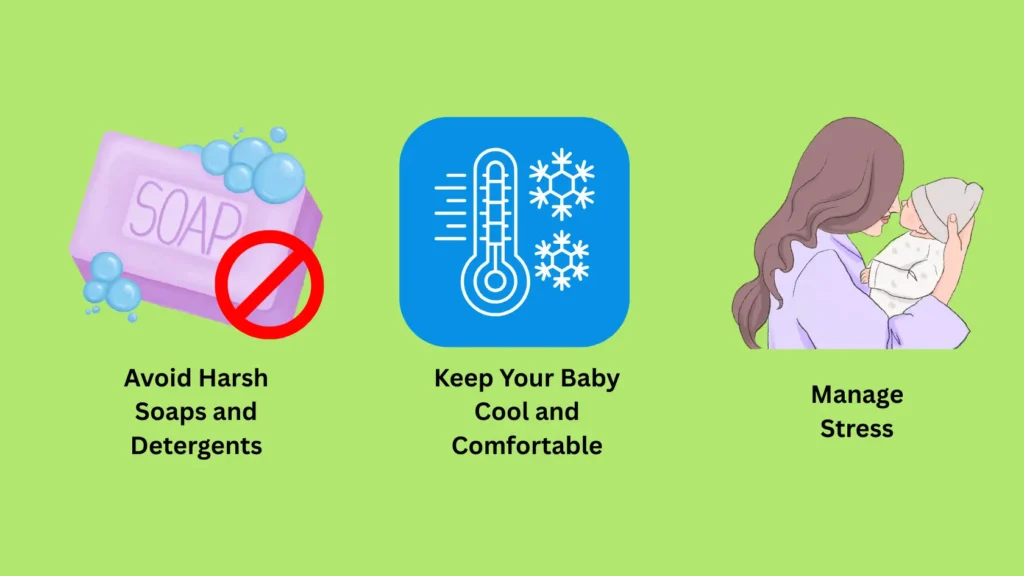
In spite of the fact that it is not always possible to stop eczema from developing, you can lessen the likelihood of it occurring by implementing the following strategies:
1. Avoid Harsh Soaps and Detergents
Select fragrance-free soaps, shampoos, and detergents that are specifically formulated for sensitive skin at all times. In addition to causing flare-ups, harsh chemicals and scents have the potential to irritate the skin. Eczema can be made worse by the use of synthetic chemicals, colors, and parabens in products. For infants, only formulas that are hypoallergenic and mild should be used. Those items that have been dermatologically evaluated are safer for sensitive skin. A number of natural substances, such as coconut oil and aloe vera, are effective in calming the skin. Avoid using sulfates and artificial perfumes because they have the potential to aggravate eczema. You should stick to items that are organic, odorless, and designed specifically for infants. When it comes to avoiding inflammation, mild soaps are essential.
2. Keep Your Baby Cool and Comfortable
Eczema can be made worse by excessive heat. You should avoid over-bundling your kid and make sure that their environment is cool. Your infant should be dressed in breathable and soft fibers such as cotton. In order to avoid itching and sweating, you should use natural fibers. Because they retain heat, synthetic textiles such as wool and polyester should be avoided. Clothing that is loose-fitting is somehow related to the preservation of ventilation, which, consequently, helps to avoid flare-ups. The fabrics which are produced using lightweight and breathable materials are the ones which are designed to facilitate the feeling of comfort, especially during the warmer seasons of the year. Perhaps, the use of humidifier could be useful in the process of maintaining an equilibrated temperature in the living area. It is possible that the utilization of a humidifier might be of aid in the process of preserving a temperature that is in equilibrium within the living space. Pajamas made of cotton are a fantastic option for reducing the amount of pain experienced throughout the night. It is possible that you will experience increased skin irritation if you sweat excessively and overheat.
3. Manage Stress
Flare-ups of eczema can be made worse by stress. It is important to provide your infant with a peaceful environment and to add activities that are comforting. You can comfort your baby by swaddling them or giving them a light massage. The inflammation that is caused by stress makes the symptoms of eczema worse. For infants, having a constant schedule helps them feel safe and decreases stress. It is important to maintain a calm and tranquil environment, with regular feeding and sleeping habits. You can also help your baby rest by playing soothing music or singing softly to them. Reduce the amount of distracting stimuli and loud noises in order to avoid overstimulation. Stress can be reduced, and eczema flare-ups can be avoided by cultivating an environment that is soothing.
FAQ: Baby Eczema
1. Can Baby Eczema Be Cured?
The disease of baby eczema can be properly managed with the appropriate medication, despite the fact that there is no known cure for the ailment permanently. It is possible to drastically lessen symptoms and enhance your baby’s comfort by using baby eczema treatments in the correct manner, hydrating your baby on a regular basis, and avoiding irritants.
2. What Is the Best Baby Eczema Cream?
The best baby eczema cream is one that is gentle, fragrance-free, and contains natural moisturizing agents. Look for creams with ceramides, colloidal oatmeal, or shea butter to lock in moisture and soothe irritated skin. Popular brands include Aveeno Baby, Eucerin, and CeraVe.
3. How Do I Treat Severe Eczema in My Baby?
For severe eczema in babies, you may need to consult a pediatric dermatologist. In some cases, prescription-strength creams like corticosteroids may be necessary. However, corticosteroids should only be used under the guidance of a healthcare provider.
4. What Causes Eczema in Babies?
The etiology of eczema in infants is unknown but the cause is believed to be a combination of environmental factors and genetic inclination. Infants born in families with a history of eczema, asthma or allergies are at greater risk.
Conclusion: Managing Baby Eczema with Patience and Care
When it comes to managing eczema in infants, a multi-pronged strategy is required. The selection of a suitable baby eczema cream, the maintenance of a consistent moisturizing routine, and the avoidance of environmental allergens are all included in this. Having a calming skincare, ensuring that you make the required changes to the lifestyle of your newborn, and choosing treatments that are safe and effective are all ways in which you can help your baby feel more at ease and mitigate the effects that eczema has on their skin.
This thorough guide offers parents who are looking for guidance and treatments for their baby’s eczema a firm basis through which to build their knowledge. In order to receive particular recommendations that are customized to your baby’s needs, you should always visit a doctor or dermatologist.
Explore more on Pregnancy Must –
